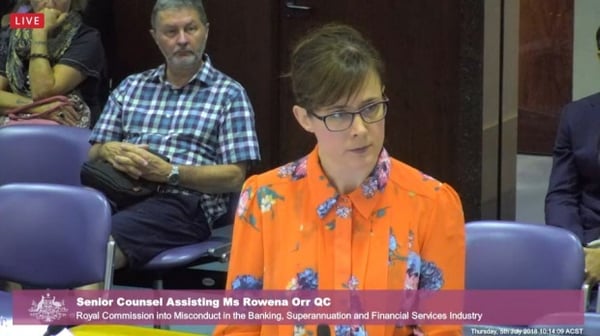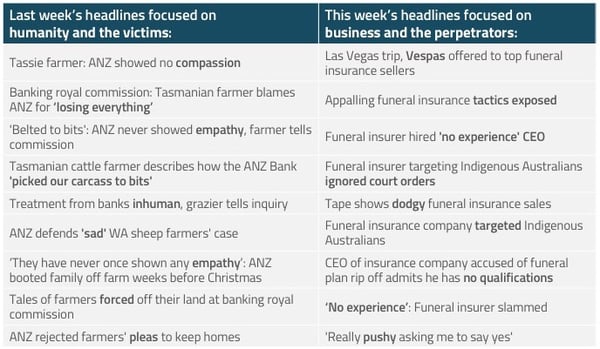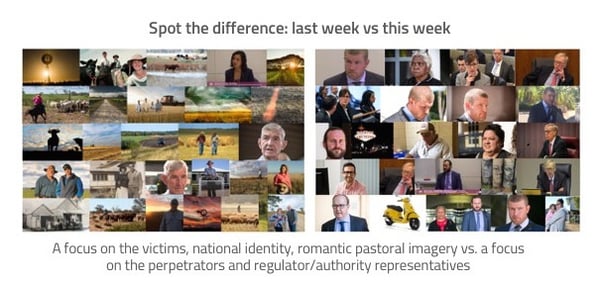Crisis Management Royal Commission Watch - Part 2
Why even a strong story can sometimes fail – and how communication and leadership go hand-in-hand

This week in numbers:
- The Commission this week generated 62% of last week’s coverage numbers (Mon-Fri)
- There were 336 mentions of “empathy” re: farmers compared to 33 re: indigenous people
- The media produced 7 profile pieces of non-Commission farmers compared to just one on an Indigenous Australian
As we make sense of the task ahead for the industry - restoring trust - we’ll share our observations as communicators. There’s no silver bullet fix, but there are ways to stop, or slow, the reputational crisis.
This week’s hearings conclude Round 4 of the Financial Services Royal Commission. What have we seen? The uncovering of serious misconduct – as bad, if not worse, than the previous week. But also, a significant drop-off in media and public interest in the Commission proceedings.
Why? We talked last week about the power of a case study – a simple story people instantly recognise, connect and empathise with, with clear characters and narrative arc. You would expect the stories exposed this week, of Indigenous Australians deliberately targeted and exploited by an aggressive sales culture into excessive fees and debt, to fit those criteria. But the story (public and media reaction) tracked differently.

Looking at the media coverage, there have been clear shifts beyond simply volume levels. The language has moved from the highly emotive headlines and column inches spent on Australia’s farmers, to far drier reporting of this week’s proceedings in Darwin.
So bored did one outlet seem by the goings on, it commented on the lawyer’s choice of outfit (only the female lawyer’s).
“Rowena Orr QC, who is looking very tropical today wearing bright orange, has launched right back into Let's Insure. ”
This, in the midst of stories of grandmothers, manipulated “by fear of death”, into buying policies where the costs outweighed the benefits.
The farmers' stories loomed so large in public consciousness that there were calls for the hearings to be extended - calls that were heeded by the Commission. No such outcry resulted from the Indigenous case studies, who were given a few days.
Where last week’s headlines focused on the victims, the social and emotional toll on their lives and marriages, this week’s stories focused on the characters better recognised by the public – the authority figures, the lawyers, the salespeople, the business people that perpetrated these offences – and the motives – the cash prizes, with trips to Vegas and Vespas taking top billing.
Why the difference? It is possibly partly timing – national fervour and intense media scrutiny can only be sustained for so long. News moves on. That said, our sense is that there's more going on here than a story that's burnt itself out.
The narratives are as strong as the farmers – highly vulnerable communities, in this case, with poor financial literacy, resources or recourse, being abused and exploited by organisations that clearly knew better.
But the public’s reaction, and the apparent solution, is far less simple.
These stories don't have the same traction in media and public imagination. They are harder for most Australians to relate to and easily understand. The problems that caused the issues we now see in indigenous financial service are more complex, interwoven with our unresolved issues in our national identity, and extend far beyond financial services. As a result, there is no “circuit breaker” solution as clean as doing away with a product, structure or executive.
The story is still following the classic narrative: stories need villains, victims, conflict and (in Hollywood) resolution. This week's reporting, cf last week's, was more about the "villains" than the "victims".


More than a lick of paint
What else did we see? We saw confusion between change in communications materials (advertising and marketing) and true business change.
One key strategy for maintaining and rebuilding a reputation is something profoundly simple. It's "do the right thing – and then communicate it, consistently and honestly".
But neither half of that strategy works without the other. We focus – in our work – on the second part, but it must follow true leadership action.
Last week, we saw more than one organisation admit that business decisions had been made based on reputational considerations – but only in individual instances. This week we saw someone try to make entirely superficial changes to paper over fundamental business problems.
For this business, many would argue it was too little too late. But the message applies more widely: for something broken, rotten or false, no amount of good communication will patch-it up in the long-term. But for a reputable business doing the right thing, failure to communicate the same also risks serious damage to both reputation and brand.
Inconsistent, ad-hoc or skin-deep communication initiatives usually fail. Business reputational damage must be addressed top-down – by strong leadership and throughout the business – not from the outside in.
Better than cure
The other distinguishing factor of this week was that we saw a much smaller organisation on the stand. An organisation, we can assume, that did not have access to the same resources as the banking giants, in terms of legal, reputational, governance and other key teams.
We were reminded again and again that the quality and quantity of professional resources and work brought to bear for such tasks is directly proportional to success.
While Royal Commissions are not common, public scrutiny is increasingly so.
For all public performances, particularly one of this magnitude, solid preparation is key. That requires external input (no matter how large or small the firm), specialist expertise and objectivity.
This preparation determines the calibre of public performance – which in turn determines media coverage and public reaction; which ultimately determines the reputational and commercial damage.
One other factor, too long neglected, is our ability to hear those we might least want to listen to: for example unhappy customers, former staff, and those who criticise us. Call it outer ring stakeholder feedback, or developing the "two ears one mouth" approach. It's a longer discussion, and not for here.
What we can safely say is that this week's Royal Commission hearings, among other things, shows that the quality of the preparation before such scrutiny directly affects your long-term reputation and the sustainability of your business.











